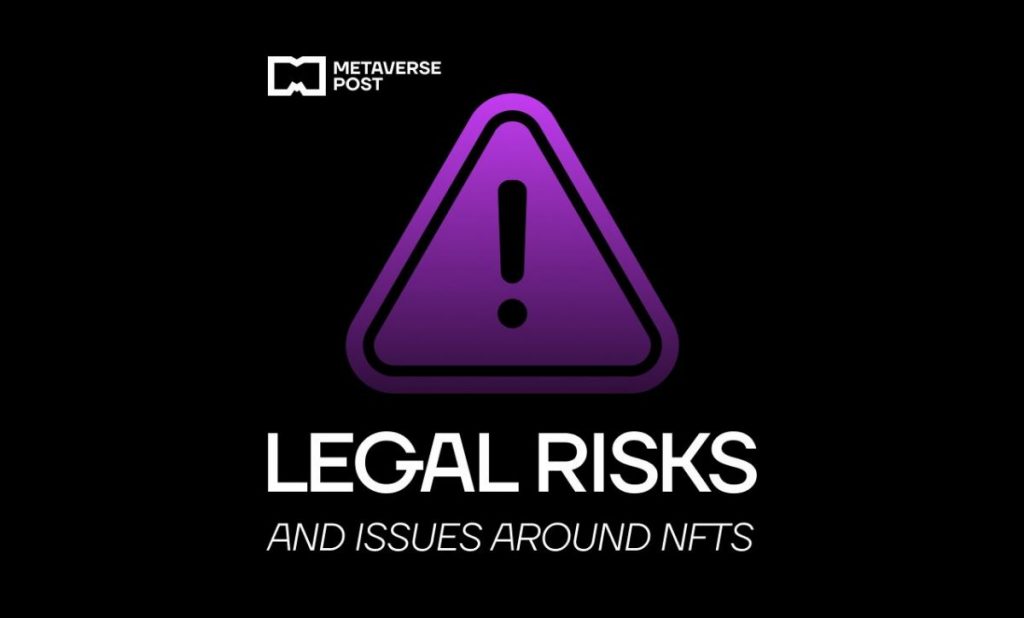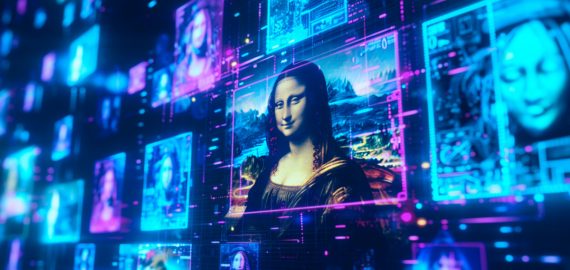Concerns Regarding NFTs: Legal Challenges, Tax Implications, and Governance Issues
In Brief
An NFT, or non-fungible token, is a cryptographic asset that denotes verifiable ownership of a unique digital item, like a piece of artwork.
Understanding ownership and licensing rights is crucial when it comes to NFTs.
As the legal field surrounding cryptocurrency and blockchain develops, it brings forth many risks and challenges associated with non-fungible tokens (NFTs). NFTs are distinct digital assets logged on a blockchain, meaning no two are exactly alike. Their one-of-a-kind characteristic allows them to be utilized in various fields such as digital artwork, gaming, and collectibles.

However, given that NFTs represent a relatively novel technological advancement, ambiguities remain in their legal standing. It’s still unclear how current laws and regulations will pertain to NFTs and what protections exist for NFT holders. Moreover, there are numerous potential hazards linked to participating in or using NFTs, including fraud, theft, legal disputes, and unpredictable market fluctuations.
Considering the uncertainties and risks involved, seeking advice from a qualified legal professional before engaging in the NFT marketplace is advisable. A lawyer can help clarify the legal framework relevant to your circumstances and highlight any risks you may need to be aware of. Additionally, they can assist you in navigating legal issues should they arise.
The Rise of NFTs
In 2021, the non-fungible token (NFT) sector witnessed tremendous growth, with sales reaching billions of dollars. This rise in interest can be attributed to several factors, such as the surge in blockchain technology adoption, the flourishing digital art and collectibles scene, and a heightened fascination with cryptocurrency.
As the NFT sector expands, so do the legal risks and challenges associated with these digital assets. The application of existing laws and regulations to NFTs remains ambiguous, and available legal safeguards for NFT holders are still being determined. Investors also face potential dangers like fraud, theft, and substantial market swings.

In 2021, NFT sales saw exponential growth, with the market being valued at approximately $20 billion early in the year, and forecasts suggest it could double by 2025. This unexpected surge was not anticipated at the start of the year when only a handful of digital artists and cryptocurrency enthusiasts capitalized on the trend, leading to the independent development of the DeFi space alongside NFTs.
“Crypto art” has emerged as one of the most notable uses for NFTs. In February, a piece of digital art by the creator Beeple sold for a staggering $69.3 million at Christie’s, ranking as the third most expensive auctioned artwork by a living artist.
NFTs have also found applications in representing ownership of various digital assets like in-game items, tickets, and memberships. The NBA’s Top Shot, a platform that allows users to buy, trade, and auction official video highlights packaged as NFTs, has reported over $500 million in sales since launching in October 2020.
NFT Risks vs. Opportunities
The enthusiasm around NFTs has been fueled by multiple factors, such as the rising popularity of blockchain technology, the booming digital art market, and an increasing interest in cryptocurrency. However, legal risks and challenges tied to these digital assets are ever-present as the NFT market continues to evolve.
Given the heightened risk of fraudulent activities, purchasers should exercise caution, ensuring they fully understand the terms and rights outlined in smart contracts, and conduct transactions only on trustworthy marketplaces when necessary.
Prospective investors need to remain cognizant of the legal implications and issues associated with NFTs prior to investing, especially since the legal protections currently available to them are limited. Furthermore, they should be prepared for market volatility, as NFT values can experience rapid fluctuations.

Both NFT users and creators must stay informed about the legal risks associated with these digital assets. The applicability of existing laws on NFTs remains uncertain, along with the legal protections afforded to NFT holders. There are also risks linked to NFT usage, including the potential for fraud, theft, legal conflict, and unpredictable market dynamics.
If you're contemplating entering the NFT space, whether buying, selling, or utilizing these assets, understanding the legal pitfalls involved is crucial. A knowledgeable attorney can guide you through the legal intricacies and help pinpoint any risks relevant to your unique situation. Additionally, should legal challenges arise concerning your NFTs, an attorney can assist you in navigating the necessary legal processes.
Legal Issues and Risks around NFTs
One significant legal concern regarding NFTs lies in the ambiguity of how current regulations may categorize them. Questions remain as to whether NFTs will be classified as securities, commodities, or another entity altogether. This uncertainty can complicate investors' understanding of their rights and responsibilities and might open doors to legal disputes.
Another pressing legal concern for NFTs is the minimal investor protection currently available. If an investor falls victim to fraud or if disputes arise over ownership, recovering losses can be a formidable challenge. Moreover, in cases of theft or loss of an NFT, asset recovery can prove difficult.

Legal considerations extend to the creators of NFTs as well. Issues arise concerning copyright laws and the protection of the artistic work linked to an NFT. Creators may also face the risk of legal action for potentially using another individual’s copyrighted material in their NFTs without proper permissions.
Due to the myriad of legal risks and issues related to NFTs, obtaining legal counsel is paramount if you're considering participation in this digital asset space. An experienced attorney can help demystify the legal landscape and identify risks pertinent to your situation. Should any challenges arise, a lawyer can also guide you through the legal process.
Privacy and Data Protection Laws
Legalities concerning data protection and privacy are further complicating factors around NFTs. For instance, the implications of GDPR for NFTs remain foggy. There’s also a concern that individuals' personal data might be recorded on blockchains without their consent, which could result in legal repercussions if individuals' rights are compromised.
It’s essential to recognize that the legal environment surrounding NFTs is in constant flux. This evolution means new legal risks and issues could arise, making it crucial to remain informed on the latest legal trends and laws. Seeking legal guidance is advisable for anyone looking to engage with NFTs.
Money Laundering
Anti-money laundering issues present another layer of legal concern regarding NFTs. There remains ambiguity surrounding how existing anti-money laundering regulations will intersect with the world of NFTs. In addition, there’s a risk that these assets could be exploited by criminals for laundering money, which may lead to legal scrutiny if authorities become suspicious of illicit activities.
If you're looking to buy, sell, or engage with NFTs, seeking legal advice is imperative. An experienced attorney can clarify the legal frameworks involved and help identify potential pitfalls. They can also assist you in managing any legal challenges that may emerge concerning your NFTs.
Security
Concerns over security are also pertinent when discussing the legality of NFTs. It's unclear how current securities laws will interact with NFT transactions, and there’s the potential threat of hackers targeting NFTs. Such vulnerabilities could lead to legal actions if investors face fraud or ownership disputes over their NFTs.
Prospects for NFT Regulation
The constantly shifting legal landscape governing NFTs means that new and unforeseen legal risks can emerge rapidly. Staying informed about the latest regulatory developments and seeking legal guidance prior to engaging with NFTs is vital. Understanding these potential issues upfront can help mitigate legal complications in the future.
FAQs
Since the valuation of an NFT is heavily influenced by market demand, there exists the risk of price manipulation through nefarious methods, such as using multiple fake accounts to artificially inflate prices during transactions.
As mentioned earlier, NFTs may indeed be linked to certain legal rights. However, two primary rights are present in this context: owning a single instance of the creative work, akin to possessing a unique object, and the right to reproduce or create derivative works based on the original creation.
While NFTs represent a novel and sometimes bewildering form of art, copyright law treats them similarly to traditional forms of artistic expression. When an artist creates a new work, they automatically receive copyright protection for it.
As a holder of an NFT, your rights are confined to what is outlined in the smart contract as well as the specific digital token. Unless the creator has explicitly stated otherwise, you do not possess the intellectual property rights associated with the NFT.
Conclusion
If you're considering the purchase, sale, or usage of NFTs, it's crucial to consult with a legal expert to navigate the potential legal challenges. An attorney well-versed in this area can help clarify the legal landscape, spot any risks specific to your case, and provide guidance should you face any legal hurdles with your NFTs.
Additional NFT resources
Disclaimer
In line with the Trust Project guidelines It's important to understand that the information available on this page should not be considered as legal, financial, investment, tax, or any other professional advice. Always invest what you can afford to lose, and if there's any uncertainty, seek independent financial guidance. For additional details, please review the terms and conditions and the help resources provided by the issuer or advertiser. MetaversePost aims to provide accurate and impartial reporting, though market conditions can shift unexpectedly.






